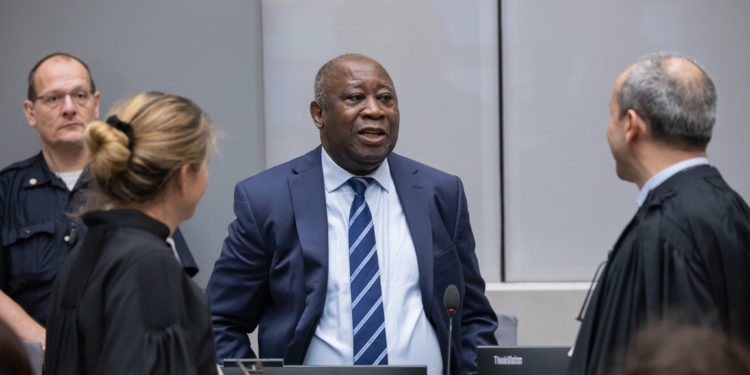By Thomas Verfuss in The Hague
When two ICC judges acquitted Laurent Gbagbo and Charles Blé Goudé in January 2019, they were quite rightly accused of a violation of the Rome Statute – a thing of the utmost gravity to say about international judges. On the other hand it would have gone against the strongest feelings of natural justice to keep the former president of Ivory Coast and his former sports minister in prison, once the judges had arrived at the irreversible conclusion that the two men are innocent. Applying the law correctly would have meant the judges would have had to keep a sick, more than 70 years old man they thought was innocent in prison for more than half a year longer, to wait for judge Geoffrey Henderson to write more than 900 pages of written motivation for the acquittal.
The dilemma stems from
article 74, paragraph 5 of the Rome Statute, the founding treaty of the
International Criminal Court, which reads:
“Article 74
Requirements for the decision
[…]
5. The decision shall be in writing and shall contain a full and reasoned
statement of the Trial Chamber’s findings on the evidence and conclusions. The
Trial Chamber shall issue one decision. When there is no unanimity, the Trial
Chamber’s decision shall contain the views of the majority and the minority.
The decision or a summary thereof shall be delivered in open court.”
This seems logical and useful in case of a conviction. The necessity of a “full
and reasoned” decision in writing may mean that the indicted persons will have
to wait a bit longer for their judgement day. But they will suffer no
disadvantage from that, as when serving their sentence, they will get credit
for the time spent in pre-trial- and trial-detention.
The full and reasoned decision has the procedural advantage for the court case
that prosecution and defense can immediately start to work on possible appeals.
In the wider context of justice seen to be done, the full and reasoned decision
can help promote the understanding and acceptance of the ICC judgement in the
country concerned by the crimes alleged. This is important as international
courts try the highest political and military leaders. The ICC is often accused
of being politicized. Acceptance of a conviction, because it is well-reasoned
and based on fact and law, can contribute to peace and reconciliation.
But the kind of tradition of “full and reasoned” judgements that has developed
in contemporaneous international criminal jurisdictions since the establishment
of the International Criminal Tribunal for the Former Yugoslavia (ICTY) by the
UN Security Council in 1993 can create a sense of injustice in case of an
acquittal when article 74 is applied. Judgements at the ICTY, the ICC and other
international and internationalised courts tend to be books with hundreds or
thousands of pages, often with hundreds or thousands of footnotes, like a PhD
thesis. Such judgements can take many months or even more than a year to write.
In case of a conviction, it is good to have it motivated well. But what
justifies keeping a suspect in detention once (a majority of) the trial chamber
has come to the irreversible conclusion that the indicted persons must be
acquitted?
Such was the case in the Gbagbo and Blé Goudé trial. Judges Cuno Tarfusser
(Italy) and Geoffrey Henderson (Trinidad and Tobago) had come to the conclusion
that the two politicians had to be acquitted because the Office of the
Prosecutor (OTP) had not presented sufficient evidence of a common criminal
plan to commit crimes against humanity against the civilian population. They
issued an oral decision of acquittal in January 2019 without written motivation
– a clear violation of article 74 (5).
Gbagbo was at that moment 73 years old and been in ICC custody for more than 7
years. The defence of the former head of state had been pleading his
provisional release several times, citing the heavy toll of the detention on
the old man’s health – but in vain. A majority of 2 of the 3 trial chamber
judges decided every time to keep the ex-president in custody, citing a flight
risk, in the face of a possible conviction for crimes against humanity and the
corresponding harsh sentence.
In January 2019 a majority of the judges had arrived at the conclusion that
Gbagbo and Blé Goudé had to be acquitted and that that conclusion was final.
After they had pronounced the acquittal, the flight risk had diminished, and
there finally was a majority for provisional release.
What justice, what ethics would have justified keeping Gbagbo and Blé Goudé in
detention any longer once the majority of the judges had the intimate
conviction that their acquittal decision was final? Yes, they violated the
letter of article 74 of the Rome Statute by pronouncing an acquittal without
written reasoning. But respecting the text of the founding treaty would have
meant keeping two acquitted men in custody for more than half a year, the time
it took to write the more than 1000 pages of written motivation in total, the
contributions of the three judges added up.
Changing article 74 to allow immediate acquittal without written motivation once
a majority of the judges has come to the conclusion that this is the final
outcome of the trial as far as they are concerned would bring the ICC practice
more in conformity with a natural sense of justice. A reform of article 74
would give states parties the opportunity to set a reasonable time frame for
the fully reasoned decision to be published, thus “disciplining” the ICC which
is often criticized for its cases and procedures taking too much time.







